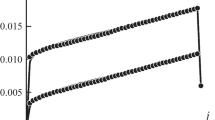Abstract
An alternative way of estimating the durability of structural plastics under stresses σ = const ∼ 0.4-0.8σf(σf is the failure stress) based on test data obtained in multiple rectangular loading-rest cycles is proposed. It is also suggested to employ the decrease in the instantaneous elastic modulus as a criterion for evaluating the residual service life of plastic parts and structures and elucidating the reasons for their early failure. For the first time, a possibility of considerably increasing the durability and endurance of structural plastics under short pulsed loadings with relatively long interruptions at the initial stage of stress concentration is considered. The cases of a significantly increased endurance of plastics caused by long interruptions after some fatigue loading by high-frequency tension cycles with a zero maximum stress are explained. First experimental confirmations of an increased durability and endurance of microcomposites subjected to short pulsed loadings alternating with long interruptions are obtained. The evolution of the effect of the loading-rest modes on the durability of massive specimens, microcomposites, and “dry” fibrous reinforcing fillers is demonstrated with examples of a glass-fabric laminate, a microcomposite, and a nonimpregnated glass strand.
Similar content being viewed by others
REFERENCES
S. N. Zhurkov and B. N. Narzullaev, “Time dependence of strength of solids,” Zh. Tekhn. Fiz., 23, 1677 (1953).
S. N. Zhurkov and E. E. Tomashevskii, “Time dependence of strength under different loading conditions,” in: Some Problems of Strength of Solids. Coll. Works [in Russian], Izd. Akad. Nauk SSSR, Moscow (1959).
R. N. Howard, The Strength of Plastics and Glasses, London (1949).
R. N. Howard, “The extension and rupture of cellulose acetate and celluloid,” Trans. Faraday Soc., 38, No. 9, 394 (1942).
R. N. Howard, “The fast and slow extension of some plastic materials,” Trans. Faraday Soc., 39, Pt. II, 267 (1943).
W. F. Busse, E. T. Lessig, D. L. Loughborough, and L. Larrick, “Fatigue of fabrics,” J. Appl. Phys., 13, No. 11, 715 (1942).
Yu. G. Korabel'nikov, Investigation of Durability of Structural Plastics at Different Modes of Static Loading and Rest [in Russian], Ph.D. Thesis, Moscow (1968).
K. V. Panferov and Yu. G. Korabel'nikov, “The effect of ‘rest’ on the durability of some polymeric materials under repeated loads,” Vysokomol. Soed., 7, No. 10, 1731 (1965).
K. V. Panferov and Yu. G. Korabel'nikov, “The effect of rest in investigating the durability under static loading,” Zavod. Lab., No. 10, 1243 (1965).
M. I. Bessonov and E. V. Kuvshinskii, “Relation between the static fracture and deformation of solid amorphous polymers,” Vysokomol. Soed., 11, No. 3, 397 (1960).
Yu. G. Korabel'nikov and K. A. Chapskii, “Variation of the instantaneous modulus of elasticity of certain types of plastics under long-term static loads,” Polym. Mech., 7, No. 3, 384–388 (1971).
Yu. G. Korabel'nikov, Ch. 2, in: A. B. Gubenko (ed.), Strength and Deformability of Structures with Application of Plastics [in Russian], Stroyizdat, Moscow (1966).
P. P. Oldyrev and V. P. Tamuzh, “Variations of the properties of glass laminate in cyclic tension-compression,” Polym. Mech., 3, No. 5, 571–576 (1967).
A. K. Malmeister, V. P. Tamuzh, and G. A. Teters, Strength of Polymer and Composite Materials [in Russian], Zinatne, Riga (1980).
V. P. Regel', A. I. Slutsker, and E. E. Tomashevskii, Kinetic Nature of the Strength of Solids [in Russian], Nauka, Moscow (1974).
S. B. Ratner and V. P. Yartsev, Physical Mechanics of Plastics [in Russian], Khimiya, Moscow (1992).
G. M. Bartenev and Yu. S. Zuev, Strength and Fracture of Highly Elastic Materials [in Russian], Khimiya, Moscow (1964).
I. Narisava, Strength of Polymer Materials [Russian translation], Khimiya, Moscow (1987).
V. A. Kargin and G. L. Slonimskii, Essays on the Physical Chemistry of Polymers [in Russian], Khimiya, Moscow (1967).
M. I. Bessonov and M. P. Kuznetsov, “Time dependence of strength of oriented polymethyl methacrylate,” Vysokomol. Soed., 1, No. 5, 761 (1959).
L. A. Layus and E. V. Kuvshinskii, “The effect of molecular weight on the strength of oriented amorphous polymers,” Vysokomol. Soed., 3, No. 3, 215 (1961).
I. V. Razumovskaya, Yu. G. Korabel'nikov, G. M. Bartenev, and K. V. Panferov, “Lifetime and relaxation processes in solid polymers,” Polym. Mech., 5, No. 4, 548–553 (1969).
Yu. S. Lazurkin, Mechanical Properties of Polymers in a Glassy State, Ph.D. Thesis, Moscow (1954).
A. A. Tager, Physical Chemistry of Polymers [in Russian], Khimiya, Moscow (1978).
A. D. Chevychelov, Microscopic Theory of Temperature-Time Dependence of Strength in Oriented Crystallizing Polymers [in Russian], Ph.D. Thesis, Leningrad (1966).
V. A. Stepanov, N. N. Peschanskaya, and V. V. Shpeizman, Strength and Relaxation Phenomena in Solid Bodies [in Russian], Nauka, Leningrad (1984).
A. V. Stinskas and S. B. Ratner, “The phenomenon of hardening during the rest in the process of fatigue failure of plastics,” Plast. Massy, No. 12, 56 (1962).
U. Bolibekov, Investigation of the Kinetics of Fatigue Failure of Polymers [in Russian], Ph.D. Thesis, Dushanbe (1973).
A. M. Leksovskii and U. Bolibekov, “Durability of polymers as a function of loading regime during repeated loading with a small number of cycles,” Polym. Mech., 8, No. 2, 225–228 (1972).
M. I. Bessonov, “Damage accumulation in rigid polymers and other bodies,” Fiz. Tverd. Tela, 11, No. 2, 410 (1969).
S. N. Zhurkov, V. S. Kuksenko, and A. I. Slutsker, “Formation of submicroscopic cracks in polymers under loading,” Fiz. Tverd. Tela, 11, No. 1, 296 (1969).
Yu. G. Korabel'nikov and A. B. Renskii, “A removable strain gage,” Auth. Cert. No. 75694 USSR, Otkryt. Izobret. Promyshl. Obraztsy. Tovarn. Znaki, No. 20 (1965).
Yu. G. Korabel'nikov and A. B. Renskii, “Measurement of strains of plastics by a removable combined gage,” Zavod.Lab., XXXI,No. 10, 1261 (1965).
Rights and permissions
About this article
Cite this article
Korabel'nikov, Y.G. Effect of Interruptions in Loading on the Durability and Deformability of Structural Plastics. Mechanics of Composite Materials 38, 335–350 (2002). https://doi.org/10.1023/A:1020032209231
Issue Date:
DOI: https://doi.org/10.1023/A:1020032209231




